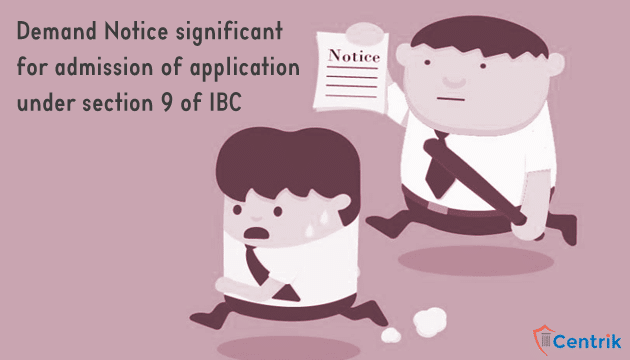
STATUS AS ON 22/05/2019
Every one of us is pretty aware about the new legislation namely ‘Insolvency and Bankruptcy Code, 2016’ (IBC). Although the said code provides equanimity to both the creditors (financial & operational) with respect to their claims whereas the only difference with two creditors approaching NCLT is the procedural one where each one of them have to fulfill certain different formalities to get the insolvency petition admitted.
As per section 8 of IBC an operational creditor, on the occurrence of a default, have to deliver a demand notice of unpaid operational debt along with the copy of invoice demanding payment of the amount involved in the default to the corporate debtor in such form and manner as prescribed. However, there is no such obligation to be fulfilled when the ‘Financial Creditor approaches NCLT under section 7.
Thereafter, the corporate debtor within the time period of 10 days has to bring into attention of the operational creditor:-
- Either the existence of dispute or record of pending suit or arbitration proceedings filed before the receipt of such notice; or
- The payment of unpaid operational debt.
If there is no response from the corporate debtor with respect to the amount claimed by the operational creditor, then the adjudicating authority (NCLT) is bound to admit the application and commence insolvency resolution process against the corporate debtor.
How important is it to issue the demand notice?
For an operational creditor to commence corporate insolvency resolution process it is mandatory for the operational creditor to issue the demand notice as per section 8 of the code. The above said compliance has to be done to make sure that there exists proper debt. To prove such debt the operational creditor is obligated to furnish with the strict proof of debt and default, otherwise the application gets rejected.
Pursuant to the aforementioned provisions of IBC, National Company Law Appellate Tribunal (‘NCLAT’) in the matter of Spice jet wherein the insolvency petition was filed by the Ramco Systems Ltd.
Brief facts of the case:-
The Ramco Systems Ltd. (‘Operational Creditor’) had entered into arrangement with the Spicejet (‘Corporate Debtor’) according to which the operational creditor raised invoices against the goods or services supplied to the corporate debtor which were not honored by the corporate debtor. Subsequently the operational creditor claimed the amount against the invoices pending and filed an insolvency application against the corporate debtor.
Nevertheless the adjudicating authority rejected the petition mainly on two grounds
- The claims were depended upon the invoices which were barred by the limitation.
- Moreover the demand notice was issued with attaching the invoice relating to the debt.
- Also, demand notices against few invoices were issued by the operational creditor.
Consequently, Appellate Authority (NCLAT) upheld the decision of NCLT and laid down that
“In the absence of specific evidence relating to invoices actually forwarded by the appellant and there being a doubt, the insolvency petition cannot be entertained under section 9 of IBC.”
CONCLUSION
Since the IBC deals with the insolvency process in a time bound manner, a single loose end between the compliances can hinder the process and defeat the purpose of the code. Therefore, In the light of aforesaid provisions and decision laid down by the adjudicating as well as appellate authority it is advisable to all of the claimants to strictly comply with the provisions of code fulfill each prior obligation on time.
Disclaimer – Please note that the above view is based on personal interpretation and for general awareness. The readers are required to take opinion from the Top IBC professionals or Insolvency Professionals before relying on the article. For any clarifications, please write to us at ibc@centrik.in




 join For Updates
join For Updates